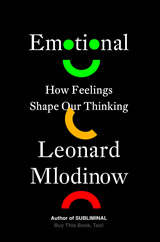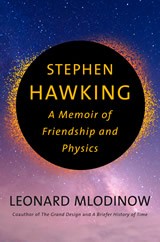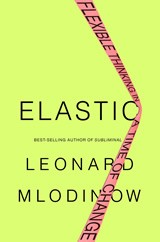Physicist and Best-selling Author
Mlodinow never fails to make science both accessible and entertaining.
— Stephen Hawking, author of A Brief History of Time
Mlodinow thinks in equations but explains in anecdote, simile, and occasional bursts of neon
— Fortune magazine
Mlodinow knows how to write for the science-challenged
— Library Journal

Leonard Mlodinow is a theoretical physicist and author recognized for groundbreaking discoveries in physics, and a passion for making science accessible and interesting to the general public. He was on the faculty of Caltech, and is the author of five best-sellers. Among them, The Grand Design, co-authored with Stephen Hawking, took the reader on a tour of the latest ideas in physics and cosmology, and reached #1 on the New York Times best-seller list. His book Subliminal: How Your Unconscious Mind Rules Your Behavior, described how a person’s thoughts, decisions, and feelings are profoundly influenced by the behind-the-scenes operation of the unconscious mind, and won the PEN/E.O. Wilson award for literary science writing. And his book The Drunkard’s Walk: How Randomness Rules Our Lives showed how the hidden forces of randomness have a huge and generally unrecognized effect on all aspects of life, as well as the course of companies and societies. It was chosen as a New York Times notable book, and short-listed for the Royal Society book award.
Dr. Mlodinow is also known through his many contributions to journals such as The New York Times, Wall Street Journal, Scientific American, Nature, and Psychology Today, and public lectures and media appearances on programs ranging from Morning Joe, to Through the Wormhole, and for debating Deepak Chopra on ABC’s Nightline. He also wrote for the television series MacGyver and Star Trek: The Next Generation. Read more ..
Latest Books
Emotional: how feelings shape our thinking (2022)
We’ve all been told that thinking rationally is the key to success. But at the cutting edge of science, researchers are discovering that feeling is every bit as important as thinking.
You make hundreds of decisions every day, from what to eat for breakfast to how you should invest, and not one of those decisions would be possible without emotion. It has long been said that thinking and feeling are separate and opposing forces in our behavior. But as Leonard Mlodinow, the best-selling author of Subliminal, tells us, extraordinary advances in psychology and neuroscience have proven that emotions are as critical to our well-being as thinking.
Read more about Emotional: how feelings shape our thinking...
Buy this book at Amazon
Stephen Hawking – A Memoir of Friendship and Physics (2020)
One of the most influential physicists of our time, Stephen Hawking touched the lives of millions. Recalling his nearly two decades as Hawking’s collaborator and friend, Leonard Mlodinow brings this complex man into focus in a unique and deeply personal portrayal. We meet Hawking the genius, who pours his mind into uncovering the mysteries of the universe—ultimately formulating a path-breaking theory of black holes, which reignited the discipline of cosmology and paved the way for physicists to investigate the origins of the universe in completely new ways. We meet Hawking the colleague, a man whose illness left him able to communicate at only six words per minute, and yet would expend the effort to punctuate his conversations with humor. And we meet Hawking the friend, who can convey volumes with a frown, smile, or simply a raised eyebrow. Read more about Stephen Hawking – A Memoir of Friendship and Physics..
Buy this book at Amazon
Elastic: Flexible Thinking in a Time of Change (2018)
From the best-selling author of Subliminal and The Drunkard’s Walk comes a groundbreaking look at the psychology and neuroscience of change, and at how tapping into elastic thinking will help us thrive in the modern world. Drawing on cutting-edge research, Leonard Mlodinow takes us on an illuminating journey through the mechanics of our minds as we navigate the rapidly changing landscapes around us. Out of the exploratory instincts that allowed our ancestors to prosper hundreds of thousands of years ago, humans developed a cognitive style that Mlodinow terms elastic thinking, a unique set of talents that include neophilia (an affinity for novelty), schizotypy (a tendency toward unusual perception), imagination and idea generation, and divergent and integrative thinking. Read more about Elastic..
Buy this book at Amazon, Barnes and Noble, IndieBound, iBooks, Kobo, Powell's or BAM.



